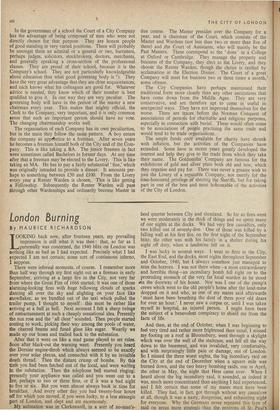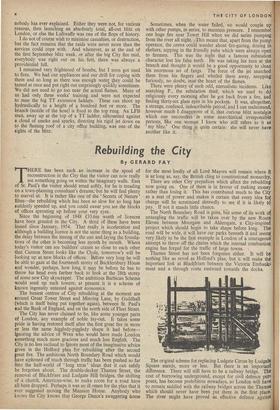London Burning
By MAURICE RICHARDSON LOOKING back now, after fourteen years, my prevailing impression is still what it was then : that, so far as I personally was concerned, the 1940 blitz on London was nothing like as bad as I had expected. Precisely what I had expected I am not certain; some sort of continuous inferno, I suppose. i There were infernal moments, of course. I remember more than half way through my first night out as a fireman in early September, arriving at a large fire in the City, not very far from where the Great Fire of 1666 started; it was one of those alarming-looking fires with huge billowing clouds of sparks dancing all over the sky and alighting on your face like snowflakes; as we bundled out of the taxi which pulled the trailer pump, I thought to myself : this must be rather like arriving at a ball hi hell. Next moment I felt a sharp twinge of embarrassment at such a cheaply sensational idea. Presently the sun rose and the 'all clear' sounded. Then people started coining to work, picking their way among the pools of water, the charred beams and fused glass like sugar. Wearily we made up our hoses and trailed back to the substation. After that it went on like a mad game played to set rules. Soon after black-out the warning went. Presently you heard the Dornier engine-throb which always seemed to be exactly over your solar plexus, and connected with it by an invisible death thread. Then the distant crump of bombs. By this tin iD you had been fetched out of the local, and were waiting in the substation. Then the telephone bell started ringing; presently your appliance was called and you went out to a fire, perhaps to two or three fires, or if it was a bad night to five or six. But you were almost always back in time for breakfast. And every other day you had twenty-four hours off for which you moved, if you were lucky, to a less strategic part of London, and slept and ate enormously. land quarter between City and slumland. So far as fires-went we were moderately in the thick of things and we spent many of our nights at the docks. We had very few casualties, only two killed out of seventy-five. One of those was killed by a falling wall at his first fire, on the first night of the September blitz; the other was with his family in a shelter during his night off duty, when a landmine fell on it.
I was lucky in several ways. I went to fires in the City. the East End, and the docks, most nights throughout September and October, 1940, but I always somehow just managed to miss the horrors. I was not there when—a most extraordinary and horrible thing—an incendiary pomb fell right on 'to the protruding stomach of the very fat local warden as he stood sin the doorway of his house. Nor was I one of the pump's crews which went to the old people's home after the land-mine dropped on it and who, as one of my mates said afterwards 'must have been breathing the dust of them poor' old dears for over an hour.' I never saw a corpse or, until I was taken myself to ' hospital, an injured person. I might have been .the subject of a benevolent conspiracy to shield me from the facts of life.
And then, at the end of October, when I was beginning to feel very tired and rather more frightened than usual, I missed my footing on a roof in Bloomsbury, went through a skylight which was over the well of the staircase, and fell all the way down to the basement, and was invalided, very comfortably. and with surprisingly little pain or damage, out of London. So I missed the three worst nights, the big incendiary raid on the City at the end of December when a square, mile was burned down, and the two heavy bombing raids, one in April, the other in May, the night that Hess came over. When I heard about the big incendiary raid, it sounded, as indeed it was, much more concentrated than anything I had experienced, and I felt certain that some of my mates must have been killed. They had, in fact, got through without any casualties at all, though it was a nasty, dangerous, and exhausting night for everyone. Why the Germans never repeated this type of raid on areas more strategic than the environs of St. Paul's. nobody has ever explained. Either they were not, for various reasons, then launching an absolutely total, all-out blitz on London, or else the Luftwaffe was one of the flops of history.
I do not of course wish to minimise casualties, or destruction, but the fact remains that the raids were never more than the services could cope with. And whenever, as at the end of the first September blitz week, or after the big City fire raid, everybody was right out on his feet, there was always a providential lull.
I remained very frightened of bombs, but I soon got used to fires. We had our appliances and our drill for coping with them and so long as there was enough water they could be tamed at once and put right out surprisingly quickly sometimes. We did not need to go too near the actual flames. Many of us had only three weeks' training and were not expected to man the big TT extension ladders. These can shoot up hydraulically to a height of a hundred feet or more. The branch (nozzle of the hose 5 is fixed to the top rung. An LFB man, away up at the top of a TT ladder, silhouetted against a cloud of smoke and sparks, directing his rigid jet down on td the flaming roof of a city office building, was one of the sights of the blitz. Sometimes, when the water 'failed, we would couple up with other pumps, in series, to maintain pressure. I remember one huge fire near Tower Hill when we did series pumping from the river all night. This meant that, apart from the pump operator, the ,crews could wander about fire-gazing, dozing in shelters, nipping in the friendly pubs which were always open to firemen. This was the night that a famous substation character lost his false teeth. He was taking his turn at the branch and thought it would be a good opportunity to clean his enormous set of fangs. The force of the jet snatched them from his fingers and whirled them away, snapping furiously, no doubt, into the heart of the flames.
There were plenty of such odd, surrealistic incidents. Like searching P., the substation thief, which we used to do religiously every morning after he got back from a fire, and finding thirty-six glass eyes in his pockets. It was, altogether, a strange, confused, indescribable perio4and I can understand, however much I disapprove of it, that curions blitz nostalgia which one encounters in some anarchistical irresponsible persons, like one woman I know who still refers to it ae my blitz.' One thing is quite certain : she will never have another like it.



































































 Previous page
Previous page